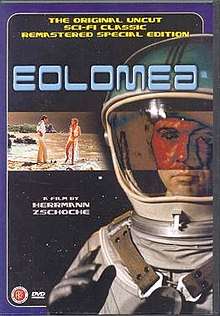Eolomea
Eolomea is a 1972 science fiction film directed by Herrmann Zschoche, based on the book of the same name by Angel Wagenstein. The film was an East German/Soviet/Bulgarian coproduction.[1]
| Eolomea | |
|---|---|
 Cover of 2005 re-release | |
| Directed by | Herrmann Zschoche |
| Written by | Willi Brückner |
| Starring | Cox Habbema Ivan Andonov Rolf Hoppe Vsevolod Sanayev Peter Slabakov |
| Music by | Günther Fischer |
| Cinematography | Günter Jaeuthe |
| Edited by | Helga Gentz |
Release date | 1972 |
Running time | 79 minutes |
| Country | East Germany Soviet Union Bulgaria |
| Language | German |
Story
Eight spaceships disappear and radio contact to the enormous space station "Margot" is broken off. Professor Maria Scholl and the high council decree a flight ban for all other spaceships. Nevertheless, one ship succeeds in leaving earth. The cause of all these strange events is the mysterious signals in Morse code coming to earth from the constellation Cygnus. Deciphered, they say the word "Eolomea," which seems to refer to a planet. With Captain Daniel Lagny, an unmotivated eccentric, Maria Scholl undertakes the risky journey to the space station "Margot" to uncover the secret, only to discover that a secretly planned expedition of stolen spaceships is leaving for Eolomea against the will of the government.
Cast
- Cox Habbema: Prof. Maria Scholl
- Ivan Andonov: Daniel Lagny
- Rolf Hoppe: Prof. Oli Tal
- Vsevolod Sanayev: Kun, the pilot
- Peter Slabakov: Pierre Brodski
- Wolfgang Greese: Chairman
- Holger Mahlich: Navigator
- Benjamin Besson: Capt. Sima Kun
- Evelyn Opoczynski: colleague of Scholl
- Heidemarie Schneider: colleague of Sima Kun
Editions
The original, uncut version of the film was rereleased by the DEFA Film Library at the University of Massachusetts Amherst in 2005.[2]
References
- Fountain, Clarke. "Eolomea (1972)". The New York Times. Archived from the original on 2013-01-30. Retrieved 2009-05-13.
- "DEFA Film Library at the University of Massachusetts Amherst". DEFA Film Library at the University of Massachusetts Amherst. Retrieved 22 May 2011.
Bibliography
- Fritzsche, Sonja. "A Natural and Artificial Homeland: East German Science-Fiction Film Responds to Kubrick and Tarkovsky." Film & History (03603695) 40.2 (2010): 80-101.
- Kruschel, Karsten: "Leim für die Venus. Der Science-Fiction-Film in der DDR." Das Science Fiction Jahr 2007 ed. Sascha Mamczak and Wolfgang Jeschke. Heyne Verlag, 2007: 803–888. ISBN 978-3453522619.
- Lessard, John. "Iron Curtain Auteurs." Cineaste 34.3 (2009): 5-11.
- Stott, Rosemary. "Continuity and Change in GDR Cinema Programming Policy 1979–1989: the Case of the American Science Fiction Import." German Life & Letters 55.1 (2002): 91.